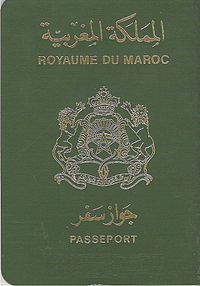- Moroccan nationality law
-
Moroccan nationality law is the subject of the Moroccan Dahir (decree) of September 6, 1958, official Bulletin Number 2394. In general, Moroccan nationality is transmitted by filiation (father and mother) or birth in Morocco. However, this gives the right to Moroccan males to transmit citizenship to their children and foreign wives, and since the last update this also possible for women. The aim of this update was to follow Morocco's recent human rights reforms, most notably the Moroccan family code called Mudawana which aimed to fight gender inequality. This has been done after much debate in the media.
Contents
The code
The code covering the Moroccan nationality was issued in 1958, two years after the independence of Morocco. The code has seven chapters and 46 articles. The main blocks of the code are the following:
Nationality by filiation
Since the last update, the Article 6 of the Moroccan code of nationality says : a child born of a Moroccan father, or a child born of a Moroccan mother is a Moroccan citizen.
Nationality by the effect of the law
According to Article 7, any child born in Morocco, of a Moroccan mother and a foreign father, is a Moroccan citizen provided that (s)he has, at the time of the declaration, a usual and regular residence in Morocco.
Any child born in Morocco of foreign parents who themselves were born after the bringing of the law into force is a Moroccan citizen (article 9). People who have obtained Moroccan nationality by the effect of the law can claim the same rights as a Moroccan having nationality of origin (by filiation).
Dual citizenship
A person having a dual nationality does not lose Moroccan nationality. However, that can create problems for people who also have nationality of countries that do not allow their nationals to have multiple citizenship. Two cases are Japan (Japanese nationality law) and South Korea (South Korean nationality law). Unlike Morocco, South Korea and Japan do not allow their nationals to keep multiple citizenships in their adult years.
Reforms
On July 2005, following the wide variety of legal and social reforms in Morocco, King Mohammed VI, in a speech given at the occasion of his sixth Enthronement anniversary, declared that Moroccan women will be able to transmit their nationality to children born of non-Moroccan father. He asked the government to submit to him sensible proposals for amending the legislation on citizenship, to make sure that the suggested amendments tally with the Family Law. [1]
See also
External links
- (French) Moroccan Nationality Code - Ministry of Communications of Morocco
- (English) The Gender and Citizenship Initiative: Country Profiles: Morocco - UNDP
Further reading
- Benjelloun, Ali; "Le Code de la nationalité marocaine", June 1959, p. 241.
- Guilho, Pierre; "La nationalité marocaine", éd. Laporte, Librairie de Médicis, 1961.
References and notes
- ^ (English) Kid of Alien Dad May Get Moroccan Nationality - Seoul Times
Nationality laws (category) By continent AfricaAsiaArmenia · Azerbaijan · Bangladesh · Bhutan · Burma (Myanmar) · China · Cyprus (Northern Cyprus1) · India · Indonesia · Iran · Iraq · Israel · Japan · Kazakhstan · South Korea · Lebanon · Malaysia · Mongolia · Nepal · Pakistan · Philippines · Russia · Singapore · Taiwan · TurkeyOceaniaEuropeAndorra · Austria · Belarus · Belgium · Bulgaria · Croatia · Czech Republic · Denmark · Estonia · Finland · France · Germany · Greece · Hungary · Iceland · Ireland · Italy · Kazakhstan · Latvia · Lithuania · Luxembourg · Macedonia · Malta · Moldova · Monaco · Montenegro · Norway · Netherlands · Poland · Portugal · Romania · Russia · Serbia · Slovakia · Slovenia · Spain · Sweden · Switzerland · Ukraine · United KingdomNorth AmericaSouth AmericaInternational
organizationsBy type Other Defunct Notes 1 Partially unrecognised and thus unclassified by the United Nations geoscheme. It is listed following the member state the UN categorises it under.Categories:
Wikimedia Foundation. 2010.

